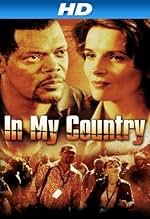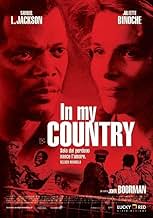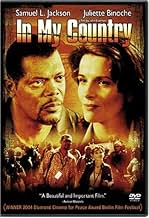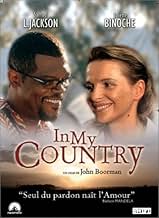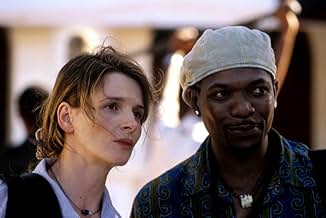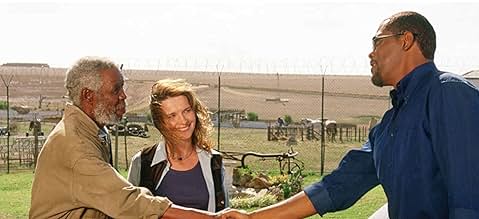A journalist and a poetess meet during the hearings of South African Truth and Reconciliation Commission.A journalist and a poetess meet during the hearings of South African Truth and Reconciliation Commission.A journalist and a poetess meet during the hearings of South African Truth and Reconciliation Commission.
- Director
- Writers
- Stars
- Awards
- 1 win & 3 nominations total
Menzi Ngubane
- Dumi Mkhalipi
- (as Menzi 'Ngubs' Ngubane)
Harriet Lenabe
- Albertina Sobandla
- (as Harriet Manamela)
Dan Robbertse
- Sgt. de Smidt
- (as Daniel Robbertse)
- Director
- Writers
- All cast & crew
- Production, box office & more at IMDbPro
Featured reviews
I thought this movie did very well in exploring many different relationships and story lines. Above all, this movie asked all of the hard questions and brought into light a lot of truth that a lot of people don't like to look at.
The African sense of justice is about reconciliation, not revenge. By using the testimonials of several individuals, this movie was very educational. The healing that was allowed to happen within the process of reconciliation was very inspirational. Their sophisticated system made a lot of sense to me, and seems much more advanced than systems employed where i live in the US.
The relationship between Langston and Anna brought a political story to a personal level. It was beautiful to see Anna come to terms with her own sense of responsibility, being a white south African who had known of the atrocities, but had done nothing to stop them. Langston forced her to examine her position, but was also there to support her when she felt crushed by the enormity. Their acting was very convincing and skillful. I especially loved the scene where Anna attacked Langston, but thought the actual sex scene could have been more believable.
One character I haven't seen anyone comment on is Anna'a assistant, Dumi. This character brought the story to yet another level. He was the classic joker with hidden depths. His character communicated to the audience that nothing is black or white; nothing is simple; really it's all endlessly complex.
In fact, this story was anything but one-sided. It showed many masks that individuals wear in specific situations. It communicated so much about humanity, both as individuals and as members of a larger society. I find it quite relevant to my experience as a white American who knows my government is responsible for the suffering of multitudes at this moment in time, and I feel responsible and helpless at the same time.
A man who sat behind me in the theater kept telling his girlfriend he wanted to leave because it was unpleasant. Yes, it is unpleasant, if you're the type of person who doesn't like to look at reality. But what I cam away with from the movie was a feeling of awe about humanity's capacity for compassion.
The African sense of justice is about reconciliation, not revenge. By using the testimonials of several individuals, this movie was very educational. The healing that was allowed to happen within the process of reconciliation was very inspirational. Their sophisticated system made a lot of sense to me, and seems much more advanced than systems employed where i live in the US.
The relationship between Langston and Anna brought a political story to a personal level. It was beautiful to see Anna come to terms with her own sense of responsibility, being a white south African who had known of the atrocities, but had done nothing to stop them. Langston forced her to examine her position, but was also there to support her when she felt crushed by the enormity. Their acting was very convincing and skillful. I especially loved the scene where Anna attacked Langston, but thought the actual sex scene could have been more believable.
One character I haven't seen anyone comment on is Anna'a assistant, Dumi. This character brought the story to yet another level. He was the classic joker with hidden depths. His character communicated to the audience that nothing is black or white; nothing is simple; really it's all endlessly complex.
In fact, this story was anything but one-sided. It showed many masks that individuals wear in specific situations. It communicated so much about humanity, both as individuals and as members of a larger society. I find it quite relevant to my experience as a white American who knows my government is responsible for the suffering of multitudes at this moment in time, and I feel responsible and helpless at the same time.
A man who sat behind me in the theater kept telling his girlfriend he wanted to leave because it was unpleasant. Yes, it is unpleasant, if you're the type of person who doesn't like to look at reality. But what I cam away with from the movie was a feeling of awe about humanity's capacity for compassion.
Watching any one of the three - Juliette Binoche, Samuel L. Jackson, Brendan Gleeson - painting a wall would be a good use of time. Seeing them all in the same movie is a rare treat.
Jackson (Pulp Fiction) is Langston Whitfield from the Washington Post, sent to monitor the Truth and Reconciliation Commission hearings in South Africa. To avoid bloodshed, the commission asked white Afrikaners to appear before a public tribunal, confess exactly what they did, convince the commission they were acting under orders, make a believable apology, and amnesty will be given.
Bonoche (The English Patient, Chocolat)is Anna Malan, a poet, who is doing daily broadcasts for the South African Broadcasting Company.
Gleeson (In Bruges, Into the Storm, The Guard) is De Jager, a a South African cop with a zeal for torture and murder that went far beyond his job requirements; a reputed psychopath that is taking the fall for all the other criminals his superiors, in a new South Africa.
Anna finds out things she really didn't want to know, and Whitfield finds that truth is not so black and white, as he believed.
Jackson (Pulp Fiction) is Langston Whitfield from the Washington Post, sent to monitor the Truth and Reconciliation Commission hearings in South Africa. To avoid bloodshed, the commission asked white Afrikaners to appear before a public tribunal, confess exactly what they did, convince the commission they were acting under orders, make a believable apology, and amnesty will be given.
Bonoche (The English Patient, Chocolat)is Anna Malan, a poet, who is doing daily broadcasts for the South African Broadcasting Company.
Gleeson (In Bruges, Into the Storm, The Guard) is De Jager, a a South African cop with a zeal for torture and murder that went far beyond his job requirements; a reputed psychopath that is taking the fall for all the other criminals his superiors, in a new South Africa.
Anna finds out things she really didn't want to know, and Whitfield finds that truth is not so black and white, as he believed.
I am not a big fan of romances, but in this case I gave it a try because of director John Boorman ["Excalibur," "The Emerald Forest," "Hope & Glory, "Deliverance"] and actors Samuel L. Jackson ["Coach Carter," "Star Wars: Episodes 2 & 3," "The Red Violin"] and Juliette Binoche ["Chocolat," "The English Patient," and the 1992 remake of "Wuthering Heights"].
This film was in the better half of Boorman's, while Jackson and Binoche gave top-notch performances. The supporting role of Dumi, played by Menzi Ngubane was excellent, as he acted both as foil and antagonist between the couple.
I think the weakest elements of this film are in screenwriter Ann Peacock's dialogue and in the construction of the Anna Malan and brother Boetie characters. The first for taking on just a little too much burden of responsibility, especially in one somewhat uncharacteristic scene at one of the hearings with a particularly gory testimony, and the latter for being incomplete when a key development occurs that should have played more into the storyline and into Anna's reactions.
From what I've heard about the book by Antje Krog, I can understand why anyone who had read it before seeing this movie might be disappointed, but it was certainly clear to me by the marketing that this was a romance and not a cinematic litany of the horrors of Apartheid.
Given the turbulent background of Apartheid and the South African Truth & Reconciliation Commission proceedings, along with other clues, I was also expecting this to be an adversaries-fall-in-love story, which is the type of romance that I like the most. The collective incidents which drive Anna and Langston together are neither contrived or turgid, and fall comfortably in between, especially because they are juxtaposed with events based in reality. There is one most significant turn at one of the hearings, which, given it is true, would bring any two adversaries together, in peace if not in love.
I don't want to give away anything about the extent of their romance, except to say that how it ended up was a pleasant surprise and quite satisfactory. I wish I could recommend two other good romances that end so similarly and satisfactorily, but I would give away the surprise.
This film is certainly worth a rental or two, worth showing to friends, but I suppose the disturbing nature of the background events might keep some people from buying it for their home library, but if you bought a copy of "American History X," I think you might want to buy this one.
This film was in the better half of Boorman's, while Jackson and Binoche gave top-notch performances. The supporting role of Dumi, played by Menzi Ngubane was excellent, as he acted both as foil and antagonist between the couple.
I think the weakest elements of this film are in screenwriter Ann Peacock's dialogue and in the construction of the Anna Malan and brother Boetie characters. The first for taking on just a little too much burden of responsibility, especially in one somewhat uncharacteristic scene at one of the hearings with a particularly gory testimony, and the latter for being incomplete when a key development occurs that should have played more into the storyline and into Anna's reactions.
From what I've heard about the book by Antje Krog, I can understand why anyone who had read it before seeing this movie might be disappointed, but it was certainly clear to me by the marketing that this was a romance and not a cinematic litany of the horrors of Apartheid.
Given the turbulent background of Apartheid and the South African Truth & Reconciliation Commission proceedings, along with other clues, I was also expecting this to be an adversaries-fall-in-love story, which is the type of romance that I like the most. The collective incidents which drive Anna and Langston together are neither contrived or turgid, and fall comfortably in between, especially because they are juxtaposed with events based in reality. There is one most significant turn at one of the hearings, which, given it is true, would bring any two adversaries together, in peace if not in love.
I don't want to give away anything about the extent of their romance, except to say that how it ended up was a pleasant surprise and quite satisfactory. I wish I could recommend two other good romances that end so similarly and satisfactorily, but I would give away the surprise.
This film is certainly worth a rental or two, worth showing to friends, but I suppose the disturbing nature of the background events might keep some people from buying it for their home library, but if you bought a copy of "American History X," I think you might want to buy this one.
The performance and production is good, overall is good. its a movie about horrors that happened in south africa by WHITE people or government. The movie has some Major flaws in Side story too.
well its kinda movie about " black lives matter" thing. a married woman with kids has a job in radio. and she want to tell the truth to the country and world about the horrors happened to that country. where she met another black journalist from america. and then they both start working together to reveal more truth but also some romantic feelings which is kinda stupid. maybe she Pity soo much about black people ?.
-----------------spoilers (flaws)---------------
a married woman with two kids, sleeping with and between two black guys in same bed?
and then she kinda fall in love and didnt think about her kids? well because its not in the movie.
in the end the husband is angry but ok with everything ?
if there is no romnatic side story then this movie could done good.
well its kinda movie about " black lives matter" thing. a married woman with kids has a job in radio. and she want to tell the truth to the country and world about the horrors happened to that country. where she met another black journalist from america. and then they both start working together to reveal more truth but also some romantic feelings which is kinda stupid. maybe she Pity soo much about black people ?.
-----------------spoilers (flaws)---------------
a married woman with two kids, sleeping with and between two black guys in same bed?
and then she kinda fall in love and didnt think about her kids? well because its not in the movie.
in the end the husband is angry but ok with everything ?
if there is no romnatic side story then this movie could done good.
It's a shame that I didn't get the emotional punch I felt as if I was supposed to have when watching In My Country, Country of my Skull to many others. You cannot force emotion and you cannot force an opinion on a film so whilst In My Country is nicely unfolded and is visually engaging for what it is, the fact that some people are pouring their hearts out in apparent regret at various points over horrific prior activity and I'm not feeling the pinch, I suppose you have to consider the film a minor failure.
But why is it that In My Country doesn't pack the necessary heat to make one identify and feel upset for the characters on screen? I think a lot of it is down to the overall approach director John Boorman adopts. The film feels like several things at once rather than an actual case-study of post-Apartheid era events that will change and affect lives just as lives were changed and affected during the era. You might argue that the best way to tackle historical issues that deal with human cruelty to other humans is to set whatever story or narrative you're doing during the actual time thus giving a first hand account of what went down and how. Many films have done this in the past but films such as The Pianist and perhaps more notably The Deer Hunter are so vast in their scale that they manage to cover life prior to 'the event'; the event(s) themselves and then the aftermath of it all through either escape or returning to their former lives before 'the event'.
Interestingly, both those films look at prisoner of war scenarios, Jews to the Nazis and Americans to the Vietnamese, respectively. In My Country is more a look at what happens after 'the event', that being the Apartheid and all the atrocities that befell South Africa midway through the twentieth century. Trouble here is that the best the rest of the world can do here is show up, look glum at a couple of press conferences in which South African men of the law admit what they did and then report on the confessions, something that one character cannot even get much space for in his respective newspaper.
As a film alone, In My Country works as a re-telling of events that happened after an atrocity but it never delves deep into its subject matter. The Apartheid and the people involved in the Apartheid are not the central characters in fact they are relegated to giving accounts at timely spaced intervals throughout the film that hope to produce the odd tear from the audience. Families of the victims bursting into tears and music native to Africa that balres up try to add to the emotion felt in these scenes. But that's about as good as it gets with the rest of it crossing genres in and out of romance, historical, melodrama and the overall approach that gets tangled up that is the docu-drama.
At its very centre, In My Country has an American journalist named Langston Whitfield (Jackson) travelling to a country to cover events few people will have an interest in. It's interesting that a film dealing with the post-Apartheid era would have an American at its core as the lead male and not a South African. There is a South African lead of sorts but they are female and they are pulled up by Whitfield on more than one occasion about the treatment they gave the black inhabitants of the nation. Here there is a confused triangle of conflict; Whitfield is American and complains about Anna Malan's (Binoche) nation's treatment of blacks but as an American he could be read into as representing America, a powerful nation that did nothing about the Apartheid anyway. Then there is the fact Whitfield is black himself and his beef with Malan's nation's treatment of blacks could just be something personal.
The fact Malan is female in the first place immediately relegates her from what she would have been had the character been male. As a male, Malan would have made a good foil for Whitfield and the personal prejudice might not have existed as much. It's no secret that women in films have always been lowered somewhat when pitted against men indeed theorists have argued that all films are shot for the male audience in mind so women view things through a male perspective when watching a film. But the fact sexual tension is present in the film between these two adds another layer of confusion and opens up the possibility that the film could fall into the romance as well as the, shock, 'buddy' genre. They fit the bill in the sense they are binary opposites to one another (black/white; male/female; American/South African, etc.) and rebound dialogue off one another but is there really space for 'buddy' content in a film about post-Apartheid South Africa?
Twinned with this, there are other sloppy instances that aid the film in its mediocrity. When we first get an introduction of any sorts of chief villain De Jager (Gleeson), it is a visit to his house at night; complete with eerie music and we see a lot of animal heads on his wall he must be a baddie. As well as this clumsy labelling, De Jager's press conference right nearer the end does not act as the final moral catalyst for the film but rather as a plot point for Anna's family to ultimately fall apart which was unfortunate. While it's all nicely unfolded and cute for what it is, In My Country bogs itself down with confused studies and feels like a missed opportunity.
But why is it that In My Country doesn't pack the necessary heat to make one identify and feel upset for the characters on screen? I think a lot of it is down to the overall approach director John Boorman adopts. The film feels like several things at once rather than an actual case-study of post-Apartheid era events that will change and affect lives just as lives were changed and affected during the era. You might argue that the best way to tackle historical issues that deal with human cruelty to other humans is to set whatever story or narrative you're doing during the actual time thus giving a first hand account of what went down and how. Many films have done this in the past but films such as The Pianist and perhaps more notably The Deer Hunter are so vast in their scale that they manage to cover life prior to 'the event'; the event(s) themselves and then the aftermath of it all through either escape or returning to their former lives before 'the event'.
Interestingly, both those films look at prisoner of war scenarios, Jews to the Nazis and Americans to the Vietnamese, respectively. In My Country is more a look at what happens after 'the event', that being the Apartheid and all the atrocities that befell South Africa midway through the twentieth century. Trouble here is that the best the rest of the world can do here is show up, look glum at a couple of press conferences in which South African men of the law admit what they did and then report on the confessions, something that one character cannot even get much space for in his respective newspaper.
As a film alone, In My Country works as a re-telling of events that happened after an atrocity but it never delves deep into its subject matter. The Apartheid and the people involved in the Apartheid are not the central characters in fact they are relegated to giving accounts at timely spaced intervals throughout the film that hope to produce the odd tear from the audience. Families of the victims bursting into tears and music native to Africa that balres up try to add to the emotion felt in these scenes. But that's about as good as it gets with the rest of it crossing genres in and out of romance, historical, melodrama and the overall approach that gets tangled up that is the docu-drama.
At its very centre, In My Country has an American journalist named Langston Whitfield (Jackson) travelling to a country to cover events few people will have an interest in. It's interesting that a film dealing with the post-Apartheid era would have an American at its core as the lead male and not a South African. There is a South African lead of sorts but they are female and they are pulled up by Whitfield on more than one occasion about the treatment they gave the black inhabitants of the nation. Here there is a confused triangle of conflict; Whitfield is American and complains about Anna Malan's (Binoche) nation's treatment of blacks but as an American he could be read into as representing America, a powerful nation that did nothing about the Apartheid anyway. Then there is the fact Whitfield is black himself and his beef with Malan's nation's treatment of blacks could just be something personal.
The fact Malan is female in the first place immediately relegates her from what she would have been had the character been male. As a male, Malan would have made a good foil for Whitfield and the personal prejudice might not have existed as much. It's no secret that women in films have always been lowered somewhat when pitted against men indeed theorists have argued that all films are shot for the male audience in mind so women view things through a male perspective when watching a film. But the fact sexual tension is present in the film between these two adds another layer of confusion and opens up the possibility that the film could fall into the romance as well as the, shock, 'buddy' genre. They fit the bill in the sense they are binary opposites to one another (black/white; male/female; American/South African, etc.) and rebound dialogue off one another but is there really space for 'buddy' content in a film about post-Apartheid South Africa?
Twinned with this, there are other sloppy instances that aid the film in its mediocrity. When we first get an introduction of any sorts of chief villain De Jager (Gleeson), it is a visit to his house at night; complete with eerie music and we see a lot of animal heads on his wall he must be a baddie. As well as this clumsy labelling, De Jager's press conference right nearer the end does not act as the final moral catalyst for the film but rather as a plot point for Anna's family to ultimately fall apart which was unfortunate. While it's all nicely unfolded and cute for what it is, In My Country bogs itself down with confused studies and feels like a missed opportunity.
Did you know
- TriviaAfter seeing this film Nelson Mandela called it, "a beautiful and important film about South Africa's Truth and Reconciliation Commission. It will engage and influence not only South Africans, but people all over the world concerned with the great questions of human reconciliation, forgiveness, and tolerance."
- GoofsAll number plates on vehicles throughout the film (apart from archival footage) are fake and do not follow the format of older South African number plates.
- Quotes
Anna Malan: [last lines - voiceover] Because of you, this land no longer lies between us but within. It breathes becalmed, after being wounded in its wondrous throat. In the cradle of my skulll it sings, it ignites my tongue. Five thousand stories are scorched on your skin. I am changed forever.. I want to say, forgive me, forgive me, forgive me.
- ConnectionsEdited into In My Country: Deleted Scenes (2005)
- SoundtracksSenzenina
Arranged by Murray Anderson & Warrick Swinney
Performed by Princess Soi-Soi Gqeza, Mxolisi Mayekane, Mandia Lande, Michael Ludonga, Simpiwe Matole & The New Teenage Gospel Choir
Published by Hi-Z Sound
- How long is In My Country?Powered by Alexa
Details
- Release date
- Countries of origin
- Official sites
- Languages
- Also known as
- Country of My Skull
- Filming locations
- Production companies
- See more company credits at IMDbPro
Box office
- Budget
- $12,000,000 (estimated)
- Gross US & Canada
- $163,893
- Opening weekend US & Canada
- $22,383
- Mar 13, 2005
- Gross worldwide
- $1,491,434
- Runtime
- 1h 45m(105 min)
- Color
- Sound mix
- Aspect ratio
- 1.85 : 1
Contribute to this page
Suggest an edit or add missing content


